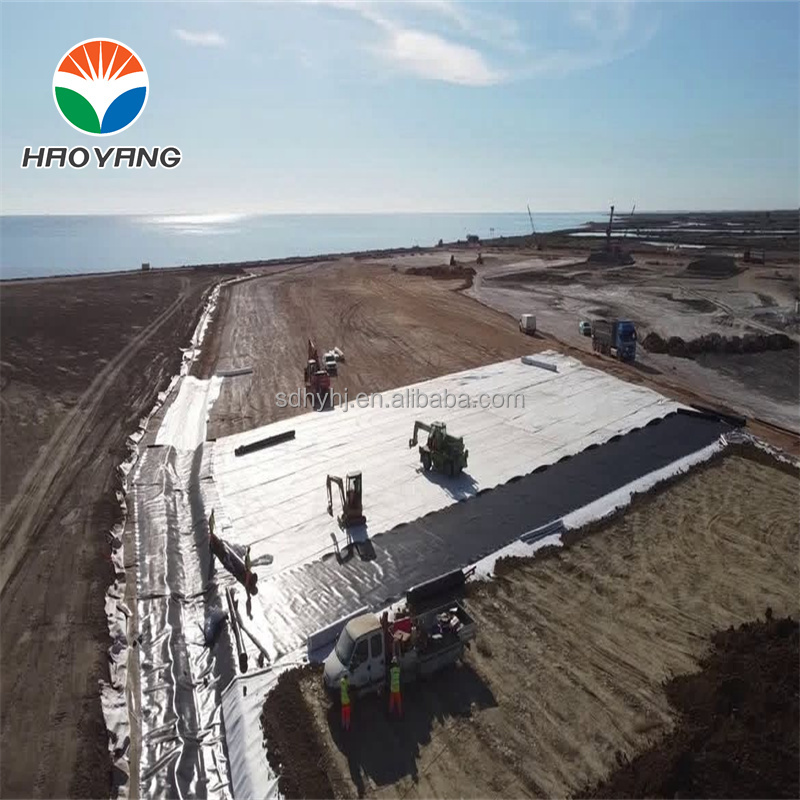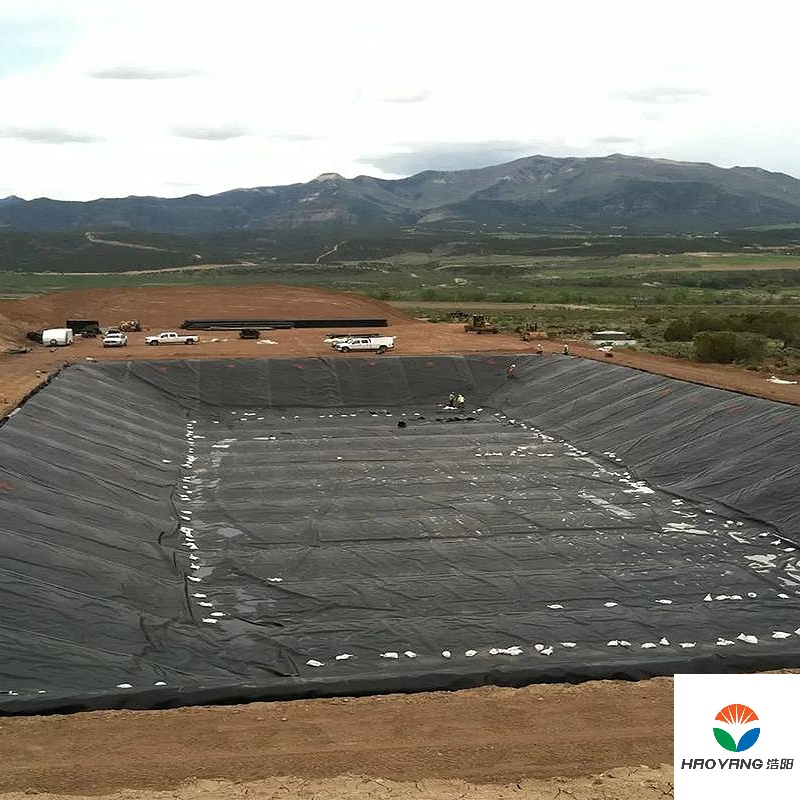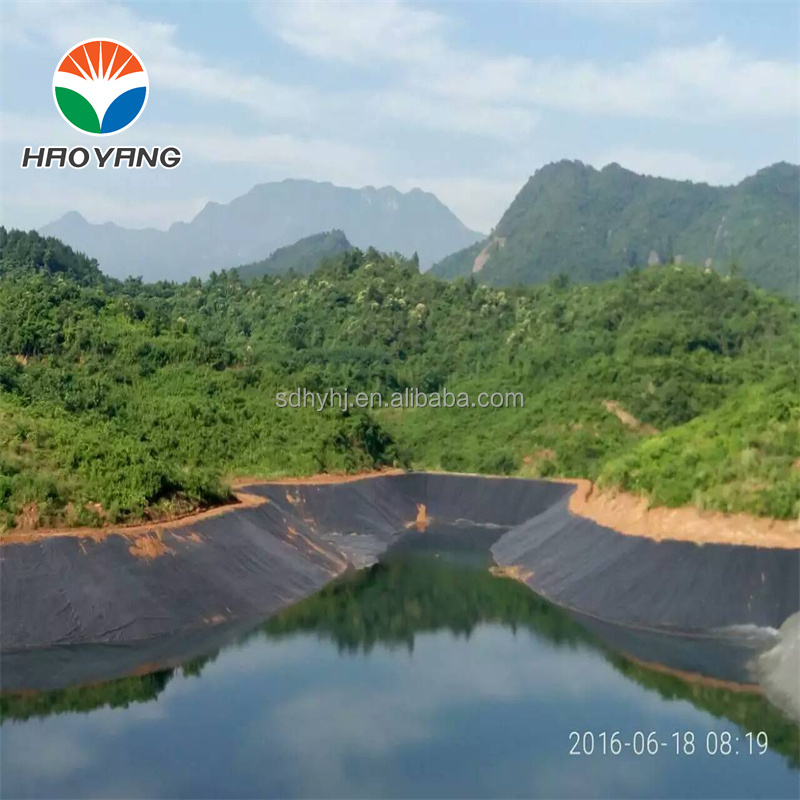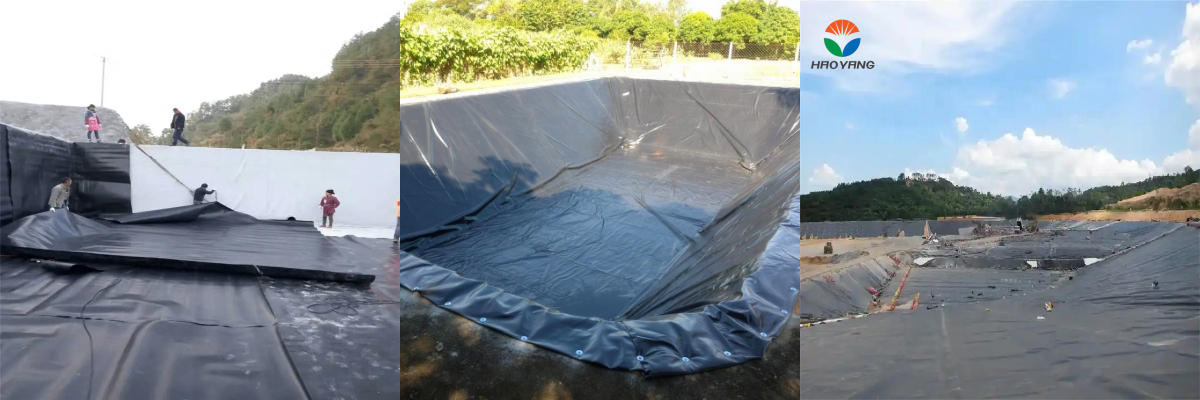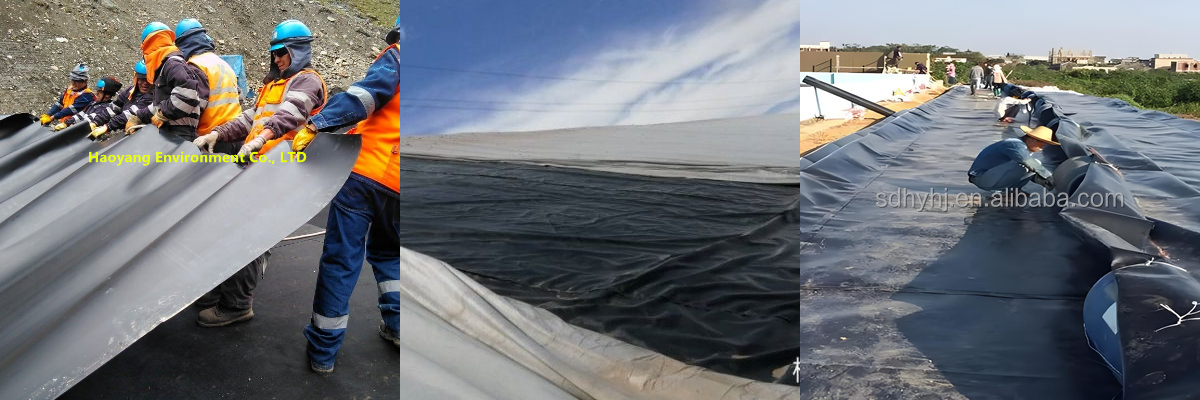Virgin 100% 0.75mm HDPE Geomembrane
1.Superior Durability & Chemical Resistance
Withstands extreme pH (2–12), hydrocarbons, and UV exposure with <0.3% mass loss after 180-day immersion tests.
Maintains 90% tensile strength retention after 5,000 hours of accelerated aging (equivalent to 10+ years of field use).
2.Cost-Effective Lifecycle Performance
Reduces total project costs by 45–60% compared to concrete liners due to lower installation labor and zero maintenance requirements.
Offers 20% higher puncture resistance than 0.5mm HDPE, minimizing repair risks in rough terrain applications.
3.Engineering Flexibility & Rapid Installation
Achieves welding speeds of 10–12 m/min (2x faster than extrusion methods) and bends to a 0.4m radius without cracking.
Lightweight design (0.9 kg/m²) cuts transportation costs and enables deployment on complex slopes.
Virgin 100% 0.75mm HDPE Geomembrane: Engineering Excellence for High-Stakes Environmental Applications
The global demand for impermeable barriers in hydraulic engineering, waste management, and industrial containment has surged, driven by stricter environmental regulations and the need for sustainable infrastructure. Among synthetic liners, Virgin 100% 0.75mm HDPE Geomembrane stands out as a premium solution, combining advanced material science with cost-effective performance. This article explores its technical specifications, applications, and competitive advantages through data-driven analysis.
I. Material Composition & Engineering Properties
The 0.75mm thickness represents a strategic balance between durability and flexibility, optimized for projects requiring enhanced puncture resistance and long-term chemical stability.
1. Raw Material Purity & Additive Technology
Constructed from 100% virgin high-density polyethylene (HDPE) resin, the geomembrane avoids recycled material impurities that compromise performance. Key additives include:
Carbon black (2.5–3.0%): Enhances UV resistance and thermal stability.
Antioxidants (0.3–0.5%): Prevents oxidative degradation under prolonged sunlight exposure.
Thermal stabilizers: Maintains mechanical integrity at temperatures ranging from -50°C to 85°C.
A comparative study by the International Association of Geosynthetic Installers (IAGI) found that virgin HDPE geomembranes exhibit 35% lower creep rates than recycled alternatives under sustained load, ensuring decades of reliable service.
2. Physical Performance Metrics
| Parameter | Test Standard | 0.75mm Virgin HDPE | 0.5mm Virgin HDPE | 1.0mm Recycled HDPE |
Tensile Strength (MD/TD) | ASTM D638 | 22 MPa / 20 MPa | 20 MPa / 18 MPa | 15 MPa / 13 MPa |
Puncture Resistance | ASTM D4833 | 420 N | 360 N | 280 N |
Elongation at Break | ASTM D882 | 580% | 600% | 450% |
Hydrostatic Resistance | ASTM D5084 | 0.8 MPa (80 m head) | 0.5 MPa (50 m head) | 0.6 MPa (60 m head) |
The 0.75mm variant demonstrates 15% higher tensile strength and 20% greater puncture resistance than its 0.5mm counterpart, making it ideal for applications with sharp debris or heavy mechanical loads.
II. Technical Advantages: Three Core Benefits
1. Enhanced Durability in Aggressive Environments
Chemical Resistance: Withstands exposure to acids (pH 2), alkalis (pH 12), and hydrocarbons with <0.3% mass loss after 180-day immersion.
UV Stability: Retains 90% of original strength after 5,000 hours of accelerated aging (equivalent to 10+ years of field exposure).
Biological Resistance: ISO 846 Grade 0 certification ensures no algae, fungal, or bacterial growth, critical for potable water reservoirs.
Case Study: A Middle Eastern oil refinery used 0.75mm HDPE geomembranes to line a 50,000 m³ wastewater pond. After 8 years, laboratory tests confirmed <2% degradation, eliminating the need for costly replacements.
2. Cost Efficiency Over Project Lifecycle
| Cost Factor | 0.75mm Virgin HDPE | 1.5mm Concrete Liner | 0.75mm Recycled HDPE |
Initial Material Cost ($/m²) | 1.2–1.8 | 3.5–4.2 | 0.9–1.3 |
Installation Labor (hours/m²) | 0.15 | 0.8 | 0.25 |
Maintenance (50-year cycle) | $0 | $12–18/m² | $4–6/m² |
The 0.75mm HDPE option reduces total lifecycle costs by 45–60% compared to concrete, primarily due to lower installation complexity and zero repair requirements.
3. Construction Flexibility & Speed
Welding Efficiency: Hot-air welding achieves speeds of 10–12 m/min, 2x faster than extrusion methods.
Bend Radius: Minimum 0.4m curvature accommodates irregular terrain without cracking.
Weight: 0.9 kg/m² (vs. 2.4 kg/m² for 1.0mm HDPE), reducing transportation and handling costs.
A Brazilian mining project reduced lining installation time by 25% using 0.75mm geomembranes, cutting labor costs by $180,000 on a 200,000 m² site.
III. Application Scenarios & Performance Data
1. Hazardous Waste Containment
In landfills, 0.75mm HDPE geomembranes paired with geosynthetic clay liners (GCLs) achieve permeability rates of 1×10⁻¹² cm/s, meeting EPA Subtitle D standards. A U.S. Superfund site reported zero leachate breakthrough over 7 years, protecting groundwater from toxic contaminants.
2. Aquaculture & Water Management
| Application | Thickness Required | Key Benefit | Performance Metric |
Marine Shrimp Farms | 0.75mm | Resists saltwater corrosion & root penetration | 30% lower water exchange rates |
Freshwater Reservoirs | 0.75mm | Prevents algal growth & UV degradation | 95% reduction in evaporation losses |
Industrial Cooling Ponds | 1.0mm | Withstands thermal cycling & chemicals | 20% higher heat dissipation efficiency |
A Vietnamese shrimp farm achieved 28% higher yield and 40% lower operational costs by switching to 0.75mm HDPE liners, eliminating pond leakage and disease outbreaks.
3. Mining & Hydrometallurgy
Tailings dams lined with 0.75mm HDPE geomembranes exhibit 98% reduction in seepage compared to compacted clay. A Chilean copper mine saved $2.4 million annually in water treatment costs while complying with ISO 14001 environmental standards.
IV. Future Trends & Innovation
The geomembrane industry is evolving toward smart materials integrated with IoT sensors for real-time leakage detection. Additionally, nanocomposite HDPE formulations are achieving tensile strengths exceeding 35 MPa, enabling thinner (0.5mm) liners with 0.75mm-equivalent performance.
Conclusion
Virgin 100% 0.75mm HDPE Geomembrane redefines impermeable barrier technology through its unmatched durability, cost efficiency, and adaptability. From hazardous waste containment to sustainable aquaculture, its technical superiority ensures compliance with global environmental standards while reducing project risks and lifecycle expenses. As infrastructure demands grow, this material will remain critical to achieving resilient, low-maintenance engineering solutions.


